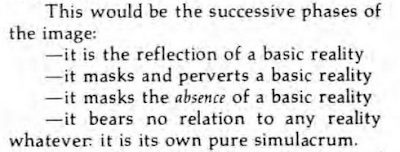It might be interesting to think about images in more straightforward terms:
-Suggesting reality (reflecting everyday)
-Distorting reality (idealizing)
-Only hinting at a possible reality (iconicism, mythical)
-Transforming our sense of reality by not relating to anything we consider real.
Relating to a reality that is understood as fantasy.
Sometimes Art isn't so straightforward, blurring such classification, unmasking via masking...
Confined to an apartment overlooking NYC's Washington square park, the extraordinary life of Andre Kertesz (1894-1985) would have a final period of solitary reflection. A gift from Graham Nash
(of Crosby, Stills, & Nash) who would occasionally visit the
apartment with his wife Susan, would help him objectify this emotional
journey...a Polaroid SX-70 camera, the ultimate creation of instant
photography inventor Edwin Land.
On page 18 of The Critical Eye Lyle Rexer states, "Kertesz had an ability to find metaphors for his inner experience." Throughout his long career Kertesz's work would embrace this, and in his last pictures that was all that was left.
 |
| August 3, 1979 |
 | ||
| April 11,1979 |
 |
| December 9, 1979 |
 |
| January 1979 |
 |
| Susan Nash, September 27, 1979 |
"Without a sense of the life and the work that have come before, the world of these last photographs may appear confined and melancholy. With that background, it appears rich with the possibility of making meaning about the most profound experiences, from the smallest things." Rexer, p.22
